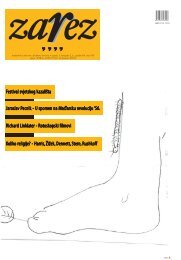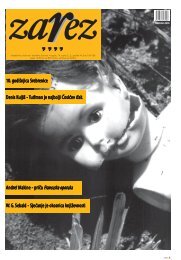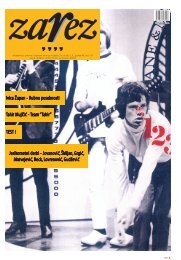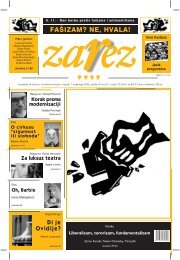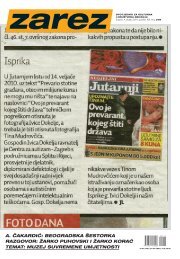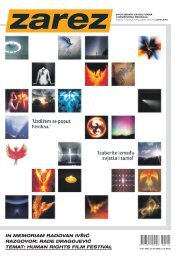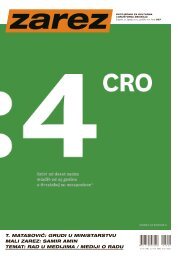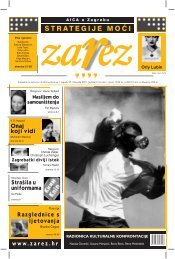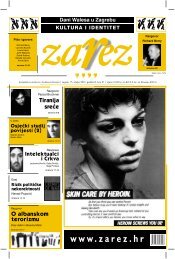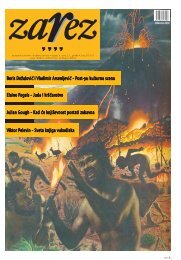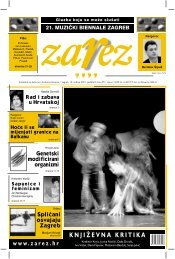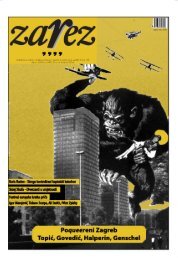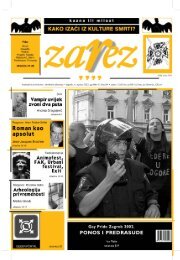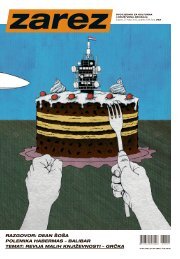20 II/40, 12. listopada 2,,,.In your introduction to NaziEtiquette, you say that your generationwas raised on the “pedagogicalprinciples of TV tube”; you oftenwrite about photography, film andcomic books as artistic media thathad a significant influence on thedevelopment of your poetics. Whatis the relationship between your literaryinfluences and the influencesfrom these media?- It’s important to note that mygeneration, that is, the generationborn between 1960 and 1973, wasthe only one from 1945 onwards tobe shaped by the same values, films,books and outlook as our counterpartsfrom other parts of Europe.Previous generations were shapedby Yugoslav socialism, and their valueswere completely different fromours. The generations that followedare being shaped by currentregimes. This is an important factorfor most people from my generationwho are now trying to do,write or film something anywherein former Yugoslavia. There’s nodoubt that the non-literary mediahave made a huge impact on thewhole generation, and of course, onme personally. I’m talking aboutfilms, music, photography, comicbooks, and finally, television. Youcan feel it really strongly in the writingof everyone who was growingup in urban areas during this period.The railway storyItalian and French reviewersoften write about connectionsbetween your fiction and DaniloKiš’s fiction.- I really couldn’t comment onthe literary and poetical connectionsbetween me and Danilo Kiš,but there is one definite linkbetween us, and that’s the railway.Claiming any other kind of connectionswith Kiš seems to me pretentiosand presumptious. The linkexists in that my grandfather,Franjo Rejc, was a high-ranking railwayofficial who concluded hiscareer as a designer of train schedules.Earlier in his career, he workedas a train dispatcher in the areabetween Usora and Sarajevo, on anumber of the small railway stationsthere, so the maternal side of myfamily was strongly shaped by thisrailway story. One of my earliestchildhood memories recalls the firsttime I felt deeply discriminatedagainst, deeply threatened andunha<strong>pp</strong>y. This would ha<strong>pp</strong>en everytime a train conducter entered ourMiljenko JergoviæWriter and journalistMiljenko Jergoviæ (b.1966, Sarajevo) writespoetry, fiction, literarycriticism and other non-fictionpieces. He has published severalpoetry collections: The WarsawObservatory (1988); Anybody StudiesJapanese in This Town Tonight/(1990); Himmel Comando(1990) and Across the FrozenBridge (1996). Jergoviæ oeuvre alsoincludes few short story collections:Sarajevo Marlboro(1994), The Karivans (1995),Mamma Leone (1999),plus the play You Say Angel(2000). His non-fiction texts arecollected in books Nazi Etiquette(1998) and A History Manual(2000).compartment to check on our tickets.My grandfather, grandmotherand my mom all had reduced-faretickets, but they always had to paymy fare. To me, that was puretragedy. I was the first one who didn’thave the right to ride on thetrains for free, so the resulting frustrationmay be the reason why Iwrote so much about my grandfatherthe railwayman. You simplydon’t forget things like that. Laterin my life, I never felt any national,social, racial or religious discriminationthat equalled what I felt onthose occasions.The importance of grandfatherThe way you write about yourgrandfather suggests that you owehim a lot, humanity-wise. Yourgrandfather was a real “character”?- My grandfather is very importantto me. My maternal grandparentsraised me and taught me everythingimportant about life.Whenever I say this, my parentsbecome unha<strong>pp</strong>y, because they feelas if they failed somewhere, andthey feel guilty. But the simple truthis that they weren’t crucial in shapingme, probably due to the factthat, although they were not thatyoung when they had me, theyweren’t ready for a child. They willprobably be ready for grandchildren.I am deeply convinced thatgrandparents make the best parents,because it’s their chance to correctthe mistakes they made with theirown children. When I look back, Isee that I grew up on stories of thetimes past. My convictions, includingthe political ones, were shapedby something that had nothing todo with either communism or anticommunism,and absolutely nothingto do with believing in God orbeing an atheist. One of the formativestories of my childhood is theone about my grandfather spendinga night in prison. It ha<strong>pp</strong>ened afterthe assassination of King Alexanderin Marseilles, on October 9, 19<strong>34</strong>.My grandfather said in some café“He had it coming” and the gendarmespromptly took him toprison, releasing him the next day.This story was unbelievably importantto me when I was a kid. On theday Sarajevo was liberated, mygrandfather, who at that timeworked in the railway’s main office,set off from his apartment to takeover the main office, in order toprevent looting or possible arson byremaining ustashas or fascists. Thatday, and the next two days, he single-handedlyran the office, and hewas overjoyed that he could playsuch an important role for once inhis life. Although he was neither apartisan, nor a communist, nor,obviously, a nationalist. The onlyarmy he ever served was EmperorFrancis Joseph’s army, where he wascaptured by Italians, and consequentlyhad a grand old time.The notes from Kiš’s manuscriptsshow that he was in two mindsabout the title of one short story - hecouldn’t decide between A ManWithout A Country and TheSpirit Is Our Homeland. Do youfeel stateless in a literary and spiritualsense?- On one hand, I think that weall, whether we want it or not, participatein the divisions, and we areall a part of some collective that isbeing more or less manipulated.However, we also have the o<strong>pp</strong>ortunityto take a some kind of individualstand. My individual stand hasbeen largely determined by my life,and my view is that I really don’tbelong anywhere to the degreewhere I would feel justified in patrioticchest-thumping. My home, myonly possible home, is Sarajevo.Nevertheless, I would say that myinner home takes precedence overany other. This inner home is reallythe home shaped by my grandparents,parents, my memories, thehome of my room and a world thatno longer exists, and that may havenever existed in the first place.Whatever the case, it certainly cameto being inside me, where it keepson living. I always carry it with me,moving it from one place to thenext at my own will, followingsome inner voice. So, I think thatbeing a person without a country,without affiliation, brings a kind ofincredibly heavenly comfort, aheavenly contentment, but at thesame time, it’s deadly. Becausebeing a person without permanentresidence, without a country and aflag that protects you, and that youcan die for, is very dangerous, andyes, deadly. On the other hand, it isthe greatest freedom that you canachieve, and you are never as free asyou are when you don’t have a flag,a coat of arms or faith in your collective.There’s a verse by MilošCrnjanski, in Verses of Ithaca that Ioften thought of in the last six orseven years, and it goes like this:“Not a single glass, not one flag thatpass, cannot be called ours." It waswritten in 1918, and it reallyexpresses that important, profoundfeeling that you shouldn’t consentto allying yourself with symbolsand people lesser than you, lesserbeing everyone who forces you todeclare your affiliation.The people who demand thatyou take sides (declare your affiliation)are really the lowest of thelow. I can still recall those monstrousdemands in 1990 that<strong>Croatian</strong> Serbs should sign statementsof their loyalty. That was disgraceful,regardless of what ha<strong>pp</strong>enedlater, regardless of the factthat <strong>Croatian</strong> Serbs took part in theaggression. That feeling of revulsionthat anybody should be askedto sign some statement of loyalty issomething I carry with me to thisday.When fear became unbearableIn his chronicle 700 Days ofSiege, eljko Ivankoviæ wrote thatin May of 1992, when the siegebegan, you were very hostile to thosewho were fleeing the city. Less thana year later, you left Sarajevo, whichwas seen as an act of betrayal. Towhat degree is staying or going amatter of free human choice, and doyou feel as a traitor because you left?- Leaving the city while it wasstill under a siege was a kind ofbetrayal, but only in the sense that Ibetrayed myself, not others. Noone has the right to point the fingerat those who decided to leave. Youcould justify their disa<strong>pp</strong>roval byciting some universal principle, as Idid with all my heart and soul, untilmy fear got too much to bear. Whenthat fear became unbearable, Ibetrayed the principle, but this ismy personal business that doesn’tconcern others, and I don’t thinkanyone should use it as an argumentagainst me. Courage is certainly avirtue, but when that virtue makes aman overstep his boundaries, thatcan’t be good. Sometimes you haveto embrace your fear, and that iswhat I did. There is one lovely,sweet anecdote from May 2, 1992,during one very heavy shelling,which caught me in, of all places,the café of the Belgrade hotel inSarajevo. That was one of the firstreally bad artillery attacks, and wewere sitting in this glass-paneledcafé, and I have to admit that I wasterribly scared. Whenever someshell hit anywhere near us, I woulddive under the table. At the tableacross from mine calmly sat an honorablegentleman called VlatkoKraljeviæ, who is now Bosnia andHerzegovina’s ambassador to Italyand Vatican, smoking his cigaretteand watching the shells fly by, andat one point, he looked under mytable and uttered the line, which hasbecome my favorite mantra wheneverI get really frightened: “Moredignity, Jergoviæ!”A lot of your fellow citizens,some of whom are probably alsoyour friends, have written about thewar, the siege, city, but the quality ofthese writings varies considerablyfrom case to case. Which authors orbooks on this subject would you recommend?- There are several authors whocould be called Sarajevan that Iwould always recommend as worthyreading. One of them is surelyNenad Velièkoviæ - whenever youfind something of his, read it; thesecond one is Semezdin Mehmedinoivæ,the third one is a wonderfulSarajevan author living in Chicagocalled Aleksandar Heman, and thefourth one is Goran Samardiæ.They all belong to that generation Ialready talked about, born between1960 and 1973, and their way ofwriting is very important, because itrepresents a novel way of looking atthings, utterly devoid of pathos andcurrent politics.Pornography and footballYou recently published an articleon pornography in Playboy, whichis something a lot of our authorswould shy away from. Did you hearany comments of the “why did he doit” variety?I consume huge amounts ofpornographic material of everytype, and I seriously think that I amone of the greatest authorities onpornography in Croatia, at leastwhere public figures are concerned,although I su<strong>pp</strong>ose some are morediscreet than I am, so we never hearfrom them. That’s why I writeabout pornography. I think that allthose platitudes about writers whohave to write about important andlofty things in order to preservetheir dignity are meaningless, andultimately detrimental to literature.If we only write about importantand fateful issues, we end up writingabout nothing. Unfortunately,<strong>Croatian</strong> literature in large measureis a literature about nothing, andperhaps it would be a good thing if<strong>Croatian</strong> writers spent more oftheir time dealing with pornographyand football. Maybe some ofthem would finally learn how towrite. The problem with the majorityof <strong>Croatian</strong> writers is that mostof them still don’t know how towrite, regardless of the number ofbooks they published. In Croatia,just like in former Yugoslavia, a personis as important as they makeout to be. Moreover, the emptiestpeople are the ones who puff uptheir importance the most, and theemptiest people are always on a crusade.A man who aspires to greatimportance will never write aboutpornography and football, becausethat won’t get him where he wantsto be.Dušanka Profeta(Excerpt from the interview,published in issue #1,February 19, 1999)
II/40, 12. listopada,,,. 21Slavenka Drakuliæwriter and journalistside from DubravkaUgrešiæ,SlavenkaDrakuliæ is the mostfamous and the mosttranslated <strong>Croatian</strong>expatriate writer. Sofar she has publishednovels Holograms ofFear, Marble Skinand As If I'm NotThere (this is literaltranslation of thetitle, but the bookwas translated inEnglish by MarkoIviæ under the title S: A Novel About theBalkans) and two collections of essayscalled Deadly Sins of Feminism and How WeSurvived Communism and Even Laughed.During the 90’s, Slavenka Drakuliæ wasmarginalized and fiercely criticized inCroatia, and her critics have covered thespectrum from members of FranjoTuðman's staff to a considerable number ofher intellectual colleagues.What kind of image do you have intoday’s Croatia? Is your reputation stilldominated by the stigma of "witch" and"traitor of the homeland"?– Answering that question is difficult. Inthis country (Croatia) there is not muchspace for the people to make their ownjudgments, nor are they accustomed tothink critically of what they are being told.My image has been created by the state-controlledmedia and they used the strategy ofpersonal attacks, insults and general nonsense.On the other hand, my works haven'tbeen published in Croatia; some of mybooks are still waiting for <strong>Croatian</strong> edition.So how can the public judge me withoutreading me? I am not the only one who suffersfrom prejudices engendered by propaganda;I share that experience with other<strong>Croatian</strong> writers, directors and actors. It isclear to me that Tuðman's regime didn’t givea fig about culture - all they were interestedin was cheap propaganda... But what we aretalking about, really, what "public" are wediscussing just now? I guess the culturalone. In that case, <strong>Croatian</strong> cultural publiclives in a situation where selling a thousandcopies of a book is considered "success",where there is only one magazine for culturalissues, where we can find hardly anydecent bookstores (which more often thannot sell stationary and office su<strong>pp</strong>lies),where publishers know that they will losemoney if they print domestic fiction... Andall that is just a part of the larger picturewhere people share the consequences ofgeneral impoverishment and high cost ofliving; most of them can’t afford a newspaper...Do you feel any sense of belonging to the<strong>Croatian</strong> literary community?– I am not familiar with "<strong>Croatian</strong> literarycommunity", I am not acquainted with itsmembers, I do not participate in their activities,I am not member of their associations,I do not publish in their journals andanthologies. Luckily, belonging to one cultureis not only a political matter; it has a lotto do with language and my emotional senseof belonging. But even in that area, I am nottruly "ethnically clean": I live on differentlanguage borders, because I write and live inEnglish. I have always lived on differentmargins and I have always considered thema very good position for someone whoneeds freedom. Since I live in several countriesand actively participate in their cultures,it must be that I am a hardened cosmopolitan.Which elements were crucial in formingyour intellectual and literary identity outsideCroatia?– As in other professions, gaining namerecognition is the most important thing. Itcan be done in a variety of ways, from publicreadings in bookshops to interviews, bygetting your work reviewed or by publishingyour articles in newspapers and magazines.All this is very important for author'sreputation. You might say that being a writeris a full-time job, especially with today’spublishers who demand much more cooperationfrom the writer than before. My journalisticcareer helps as well, and it’s no accidentthat I have been writing essays forItalian, German, American, Swedish etc.newspapers and simultaneuosly publishingmy books in the same countries. I often participatein international conferences and Ihold university lectures. It all reaches differenttypes of audience and therefore createsauthor’s visibility. My first book that waspublished outside Croatia, in Germany, wasthe novel Holograms of Fear (in 1988; thepublisher was Rowohlt's edition NeueFrau). Than Marble Skin a<strong>pp</strong>eared, publishedby Robert Laffont in France.Laffont's offer came as a reaction to a smallexcerpt from the manuscript that was publishedin a Canadian journal; I was invited tosubmit the rest of the book. What I want toemphasize, contrary to common opinionthat foreign market accepted me thanks primarilyto my book of essays How WeSurvived Communism and Even Laughed, isthat what cracked the ice were my novels.True, the Anglo-American audiences at firstdid not accept my novels (I had tried topublish Holograms of Fear without successin England and America); what helped methere was the book of essays. Nothingworked until the editor of W.W. Norton,who has read my articles in The Nation,suggested that I write a book of essaysabout my life in Communism...Andrea Zlatar(Excerpt from an interviewpublished in issue # 24, February 3, 2000)Predrag Luciæeditor at Feral Tribune weeklyand Feral Tribune Publishingeral Tribune Publishing was startedsix years ago, publishing nearly sixtytitles during that time.Could you explain your basic editorialpolicy and tell us about the common groundbetween Feral Tribune the magazine andits book division?– Feral Tribune Publishing is simply thecontinuation of Feral Tribune by practicallythe same means, in the same way that FeralTribune weekly is thecontinuation of the erstwhilesatirical su<strong>pp</strong>lementin Nedjeljna Dalmacija.The book divisionis the logical resultof the same need thatcreated our weekly, theneed of a few peoplewho wanted to respondto the deceit of the timeswe live in the same wayany literate person whosehonor hasn’t beenamputated should respondwhen they recognizethat they’ve beencheated.Now that we are surrounded by peoplewho have miraculously regained clear sight,I think my <strong>15</strong> years at Feral has earned methe right to ridicule the fashionable frustrationof all those who claim that they’vebeen cheated. The truth is that the onlyones who had been cheated are those whowanted to be cheated – some for personalcomfort, some because they couldn’t bebothered to think, and some because theyfell for the siren song of mob rule. You see,once you allow them to throw dust in youreyes, you don’t even have to bury yourhead in the sand. It’s already there. So, Idon’t as a rule give much credit to hindsight,because hindsight rarely involvesadmitting previous lack of insight. Foryears we at Feral have been writing a paperthat was regularly burned in public, whilethose freshly clear-sighted types kept theireyes firmly closed. You know, if you squintin front of a burning stake, I guess thatwhatever you manage to glimpse may seemlike a pretty fireworks display. If thatmakes it easier for you, O.K., fine, haveyourself a ball… We have also publishedbooks that didn’t speak to ignoramuseswho always justify the times by sayingthat’s the way it is, for the simple reasonthat they never read them. And they didn’tread them because it’s Feral, and Feral is soicky-poo. All I can say to those fine,upstanding citizens who found Feral vulgarwhile pretending that <strong>Croatian</strong> reality wasanything but, is the paraphrase of you’llknow-who:a box of poisonous letters isthe ultimate human invention in defense ofone’s dignity.How do you find potentially interestingworks?– We find each other: the book divisionfinds the writers, and writers find the bookdivision. The magic of this game lies in theact of mutual recognition. Feral’s name carriesenough weight for people to recognizewhether this is the space that intereststhem or not. What I and other Feral editorshad to do was make sure that our first tentitles dispelled any possible confusion thatour name might have caused: namely, thatin keeping with the local customs, anybook division of a magazine must necessarilyremain within the boundaries of nonfictionwriting. Once people realized thatFeral fully intends this venture to cross allbou-ndaries, they startedgiving us their unconditionalhelp. And that’swhere my worries withsurplus manuscriptsbegan. I remember thewish list I wrote themorning after the ideaabout publishing booksfirst struck me. I was stilldrunk with possibilities,and among the namesthat I wrote down werethose of Mirko Ko-vaèand Predrag Matve-jeviæ.I also wrote down thetitles: Crystal Bars andEpistles from Other Europe. I didn’t knowat the time that both books already hadpublishers. When I found out, I admit thatI was angry at myself for not thinking ofstarting the book division sooner, but –respecting the fact that both Kovaè andMatvejeviæ already had publishers – I decidedagainst calling them and inviting them topublish their next books with us. I am nottelling you this because I want people tosay “Oh, look how polite and consideratehe is!” or “What a moron!”, which is probablycloser to the truth, but because I wantyou to try and imagine how overjoyed Iwas when both Kovaè and Matvejeviæ laterrecognized Feral Tribune Publishing as theirspace. The fact that, say, Milan Kangrga,who has already had his Selected Works published,and Marinko Košèec, who was neverpublished before, also recognized thisspace as their own is to me the biggestcompliment for my publishing madness.No, no, no… don’t be afraid, I won’tlaunch into obligatory lamentation on thesorry state of publishing in this country. Iwill simply quote Kiš, and repeat somethingyou already know: We are publishingin the desert. And even if it is madness, it ismy madness.Katarina Luketiæ(Excerpt from the interview, published inissue #17, October 28, 1999)TatjanaGromaèapoet and journalistHow do you feel after the successof your first poetry book,called "Is Something Wrong"?- I feel like any other creature:merry for a moment, then blue.First fearful, then calm, at thesame time fulfilled and empty. Mystate of being has nothing to dowith the success of my book. I testit with this simple exercise: when Ifeel down and try to get better, Isay to myself: "Hey, why such longface, your book is such a success!",but it doesn't work. It doesn’thelp. And if it doesn’t help when Ifeel sad, I don't need it to help mein any other case. I don’t think ofmy book when I’m ha<strong>pp</strong>y; thereare other things to think when oneis ha<strong>pp</strong>y. So, it seems that whenI'm ha<strong>pp</strong>y, I'm ha<strong>pp</strong>y regardless ofthe book. Well, the purpose of thebook is obviously to look at itoccassionally and say "OK, dear,you just be here with me!"In your poetry, why are you sofocused on reality?- Everyone writes about thethings that catch his or her eye.The eye searches for certain condition,certain emotion we try toexpress. It is clear that, in mypoetry, the concentration on realityis really a trick, just like the realityitself is a realm of tricks andillusions. Objects are firm, clear,shaped - but everything else isinstability, change, fighting. Realityis best described as a successionof images on the surface, theend of the telescope throughwhich one see the things that reallyexist; inner things. Heart of theocean.Describe your relationship withother writers?- There are many writers Irespect. Some of them I used tolove in certain periods of my life,but I still respect them (although Ihaven't read them in years). But Iwould always defend their honor.And there is also a constant flowof new books, new names thatseduce me. The search never ends,and that's good. I love the feelingof discovering a new book or twojust after I conclude that there isnothing there for me. Like birds,we select these grains and pushthem to our little corner. Let thembe here, let them defend our identity.Bulgakov, Babel, Kiš, Crnjanski,Popa, Ladin, Mehmedinoviæ,Rešicki, Dragojeviæ, Hamvas,Maspero, Cendrares, Cesaire, Callaghan,Ondaatje, Carver, Atwood,Dante, Bukowski, Salinger,Kureishi, Canetti...How do you see your future?- I see my future, or I wouldlike to see it, as an ordinary humanfuture. Everything I intend to do,I intend to do as a human being,not as a poet. I don’t have particularlybig literary ambitions, andthat suits me just fine. At themoment, I make my living as anindependent journalist, and Ibelieve some day I would love toreturn to teaching.Rade Jarak
- Page 2 and 3: 2 II/40, 12. listopada 2,,,.gdje je
- Page 4 and 5: 4 II/40, 12. listopada 2,,,.Davorka
- Page 6 and 7: 6 II/40, 12. listopada 2,,,.Nakladn
- Page 8 and 9: 8 II/40, 12. listopada 2,,,.Andrea
- Page 10 and 11: 10 II/40, 12. listopada 2,,,.Pjesni
- Page 12 and 13: 12 II/40, 12. listopada 2,,,.U uvod
- Page 14 and 15: 14 II/40, 12. listopada 2,,,.Irena
- Page 16 and 17: 16 II/40, 12. listopada 2,,,.o you
- Page 18 and 19: 18 II/40, 12. listopada 2,,,.n her
- Page 22 and 23: 22 II/40, 12. listopada 2,,,.Roman
- Page 24 and 25: 24 II/40, 12. listopada 2,,,.Miljen
- Page 26 and 27: 26 II/40, 12. listopada 2,,,.Sonja
- Page 28 and 29: 28 II/40, 12. listopada 2,,,.Marink
- Page 30 and 31: 30 II/40, 12. listopada 2,,,.Igor M
- Page 32 and 33: 32 II/40, 12. listopada 2,,,.eljko
- Page 34 and 35: 34 II/40, 12. listopada 2,,,.FRAKCI
- Page 36 and 37: 36 II/40, 12. listopada 2,,,.Miljen
- Page 38 and 39: 38 II/40, 12. listopada 2,,,.Sonia
- Page 40 and 41: 40 II/40, 12. listopada 2,,,.Marink
- Page 42 and 43: 42 II/40, 12. listopada 2,,,.Igor M
- Page 44 and 45: 44 II/40, 12. listopada 2,,,.eljko
- Page 46 and 47: 46 II/40, 12. listopada 2,,,.Frakci
- Page 48: 48 II/40, 12. listopada 2,,,.Hrvoje



